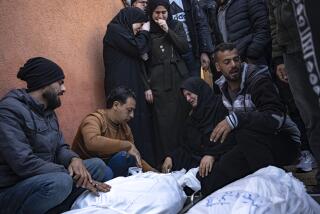Blast victims mourned as toll rises
- Share via
BAGHDAD — Grief engulfed this city’s most prosperous and lively enclave Friday as residents mourned loved ones who were lost in a suicide bomb attack a night earlier.
Authorities said the death toll had risen to 68 and that 120 other people were injured in the Thursday evening assault, which targeted the busy Karada shopping and residential district. Fatalities climbed steadily overnight as patients who had suffered severe burns and shrapnel wounds died.
The carefully planned attack was one of the worst in Baghdad in months. After the first bomb went off, a huge crowd of people gathered, and minutes later they became the target of an assailant wearing a bomb underneath his leather jacket, police said.
Along Karada’s streets Friday, funeral tents were spread open. Weeping relatives strapped simple wooden coffins to the roofs of white Chevy Suburbans and creaky Korean-made minivans, driving slowly through the neighborhood’s main streets as people in black walked behind, beating their chests and wailing.
Shops remained shuttered, and the neighborhood was closed to outside traffic as young men swept the blast site of debris.
Most of the coffins were driven south to Najaf’s Valley of Peace cemetery, the largest and most important burial place for members of Iraq’s Shiite Muslim majority.
Many of the victims were residents of the neighborhood, enjoying an evening out. U.S. and Iraqi officials blamed the attack on Al Qaeda in Iraq, a loosely organized network of Sunni Arab extremists.
“This terrorist attack was a senseless act of violence directed against the Iraqi people,” U.S. Col. Allen Batschelet of the 4th Infantry Division in Baghdad said in a statement.
Violence in Baghdad was minimal Friday, but a pair of attacks targeted Iraqi law enforcement officials in the northern city of Mosul.
In one incident, a suicide car bomber rammed a downtown police station, killing four civilians and injuring 33. Later, a roadside bomb exploded near the home of a police officer. When people gathered at the bomb site, another blast went off, killing one person and injuring 14, police said.
Sectarian and political violence has slowed overall in the months since a security plan in Baghdad went into effect, but bombings and killings continue. The bodies of at least three men were discovered Friday around the capital.
Security gains have not been matched by political cooperation among the nation’s feuding sectarian and ethnic groups. That has led to a fragile peace that could be upended at any time, said Wamidh Nadhmi, a Baghdad University political scientist.
“There exists an option of violence in the absence of political progress,” he said. “I think this feeds Al Qaeda.”
U.S. troops and Iraqi police continue pursuing both Sunni Arab militants suspected in bomb attacks and Shiite militiamen believed to be behind assassination campaigns.
U.S.-led forces in Baghdad captured a suspect who allegedly coordinated the training, funding and arming of militants on behalf of Iran, the U.S. military announced.
Early Friday, Iraqi security forces raided an office belonging to radical Shiite cleric Muqtada Sadr’s movement, arresting two men and discovering half a ton of mercury stored in barrels. Tiny slivers of mercury can be used for detonators, but such large quantities of the poisonous substance could also fetch a price on the black market.
--
--
Special correspondents in Baghdad, Basra, Hillah and Mosul contributed to this report.
More to Read
Sign up for Essential California
The most important California stories and recommendations in your inbox every morning.
You may occasionally receive promotional content from the Los Angeles Times.













